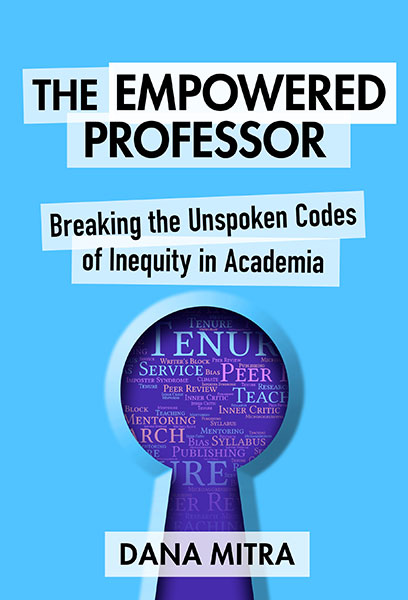Professors: Request an Exam Copy
Print copies available for US orders only. For orders outside the US, see our international distributors.
Publication Date: December 3, 2021
Pages: 160

How can new faculty find success in academia and what can universities do to support them?
In this book, the author demonstrates how a coaching-focused stance toward faculty development can improve equitable conditions within the university and contribute to faculty retention and well-being. For faculty and graduate students, this book emphasizes the skills needed to be a successful academic with a focus on lifespan learning. For universities, this book articulates how institutions can implement an equity-driven plan for faculty development. In the first section, Mitra investigates the structures that can contribute to inequities, spotlighting the unspoken assumptions and lack of clarity of institutional processes. In the second section, she interweaves the building blocks needed for faculty success (agency, belonging, and competence) with the traditional academic expectations of research, teaching, and service. With engaging vignettes and extended examples of faculty experiences, The Empowered Professor centers on the space in which individuals can find success within academic settings while maintaining the integrity of themselves.
Book Features:
Dana Mitra is a professor of education policy studies at the Pennsylvania State University. Her books include Civic Education in the Elementary Grades: Promoting Student Engagement in an Era of Accountability.
“Whether it’s used as a primer or a review tool, this book explicitly addresses the complex web of needs and concepts faculty must understand to develop a meaningful and successful academic career…. In sum, this text is a good resource for scholars and academics in American higher education.”
—Teachers College Record
“The Empowered Professor is a thoughtful, powerful, and practical guide—a must-read for graduate students, faculty, mentors, and campus leaders alike. It is masterful in its balance, simultaneously demystifying the complexities of the academy, spotlighting inequities embedded in structures and systems, and providing scholars with tools to tap into their truth and authentically pursue their goals.”
—Kimberly A. Griffin, professor and associate dean, college of education, University of Maryland
“With over a decade of experience and drawing on others’ perspectives, Mitra challenges universities’ structural and cultural impediments to faculty success. She thoughtfully offers an equity-driven model of faculty development to help dismantle institutional barriers and enhance faculty agency, belonging, and competencies (ABCs).”
—Gaëtane Jean-Marie, dean and professor of educational leadership, Rowan University
Contents
Acknowledgments xi
1. Introducing a Coaching Approach to Faculty Development 1
Faculty Can Find Agency and Purpose 2
Universities Can Bolster Faculty Development 2
Framework: The Intersection of Structure and Agency as a Pathway to Fulfillment 3
Part I: Breaking the Institutional Code 4
Part II: Strengthening Academic Identity 5
PART I: BREAKING THE INSTITUTIONAL CODE
2. Unspoken Structures in the Academic Code 11
Identifying Codified Structures 12
Normative Processes—The Culture 13
Cognitive Processes: Hidden Beliefs and Structures 15
Implicit Bias and Privilege as Cognitive Structures 15
Creating an Inclusive and Welcoming Climate 17
Addressing Grievances 19
The Institution of Tenure 20
Recommendations for Universities 23
3. The Inner Critic 24
Shame Triggers With the Inner Critic 25
Finding the Inner Critic in the Body 26
Stepping Away From the Inner Critic 27
Rumination: The Inner Critic on Repeat 28
Inner Critics and Stress Response 30
Getting Unstuck From Writer’s Block 31
The Critic in Academia: Peer Review 32
Speak Your Truth 34
Recommendations for Universities 35
PART II: STRENGTHENING ACADEMIC IDENTITY
4. Agency 39
Tapping Into a Deeper Purpose 39
Charge Batteries; Don’t Drain Them 40
Learning What Purpose Feels Like 41
Identifying Core Values 42
Purpose as Career-Long Trajectory 42
Finding Leaders and Mentors Within 44
Recommendations for Universities 48
5. Research 49
Building a Scholarly Identity 49
Maximizing Publishing While Protecting Purpose 51
When Purpose Questions Dominant Paradigms 53
Recommendations for Universities 55
6. Belonging 56
Connecting to Others 57
Intellectual Spaces: Finding Collaborators 58
Multiple Sources of Support 59
Building a Community 60
Collaborations Gone Awry 61
Strategic Conferencing 62
Network Everywhere 65
Identifying Cultural Biases Related to Communication 66
Support Spaces: How to Find Mentors 68
Outside Letter Writers 70
Finding Belonging Within and Beyond Academia 71
Recommendations for Universities 72
7. Service 73
Chosen Service—“Want-to-Do” Work 73
Required Service—“Must-Do” Work 75
Service That Can Be Avoided—The Art of Saying No 77
Mid-Career Academics: Creatively Broadening Contribution 79
Recommendations for Universities 81
8. Competencies 82
Goal-Setting 83
Time Management: “Plan Your Work, Work Your Plan” 86
Identifying Self-Care 88
Delete, Delay, Delegate, Diminish 90
Productivity 92
Recommendations for Universities 96
9. Teaching 97
Getting Rid of Inner Critics in the Classroom 97
Improved Confidence in the Classroom 97
Overcoming Imposter Syndrome 98
Competencies of Teaching 99
Competencies of Online Teaching 101
Competencies of Simplified Grading 102
Addressing Structures That Replicate Bias and Discrimination 103
Empowering Students by Creating Equitable Classroom Spaces 105
Recommendations for Universities 108
10. Conclusion 109
Appendix A: List of Core Values 111
Appendix B: My Strategic Plan, 2017–2018 115
Appendix C: Sample Paper Rubric 119
References 121
Index 135
About the Author 145
Professors: Request an Exam Copy
Print copies available for US orders only. For orders outside the US, see our international distributors.